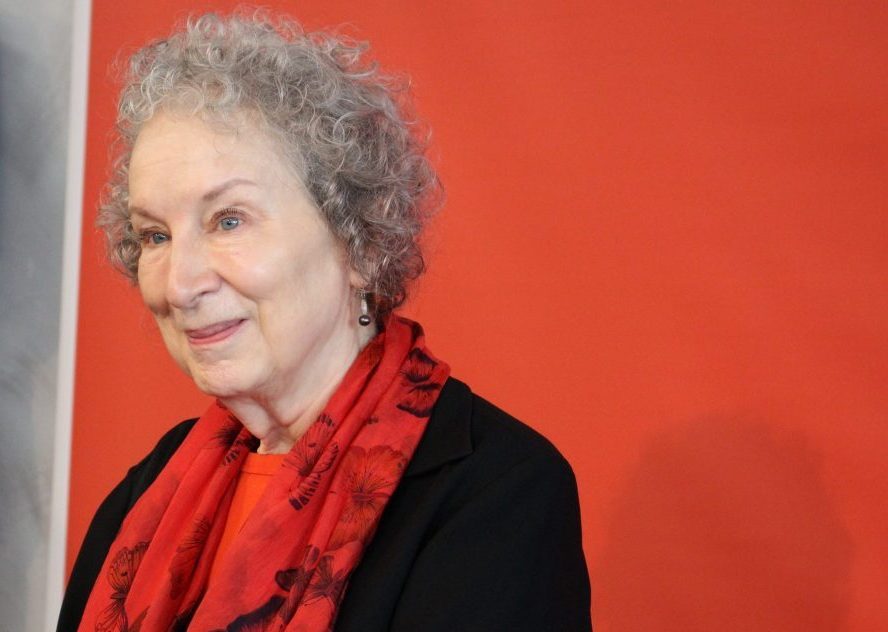Someone once said, “It’s not don’t meet your heroes, it’s don’t have shitty heroes,” and for many who woke up this week to news of notable Canadian author Margaret Atwood trending right above the words “TERFs,” that idea hit close to home.
There she was, the woman whose most famous work is a massively successful book — turned into a massively successful TV show — about a dystopian future, one where women were reduced to nothing more than their reproductive capabilities, retweeting a Toronto Star op-ed by columnist Rosie DiManno called “Why can’t we say ‘woman’ anymore?” a particularly specious question given how often we all still use the term “women” on a daily basis.
Why can’t we say ‘woman’ anymore? https://t.co/ghcQDJgxWE via @torontostar
— Margaret E Atwood (@MargaretAtwood) October 19, 2021
The article itself is a series of umbrages taken with the way some language has been modified to be mindful of transgender and non-binary people, for example, saying “pregnant person” in lieu of “pregnant woman” to accommodate pregnant trans men and non-binary people. DiManno sees the adoption of inclusive language as, somehow, the erasure of women.
But more than that, Atwood was amplifying a TERF (trans-exclusionary radical feminist, essentially women who don’t include trans people in their feminism) dog whistle, which, given her two-million-plus following on Twitter, is a dangerous proposition.
To some, this was a massive betrayal of someone they saw as a feminist icon. To a lot of people in Canada who have their ears closer to the conversation, this is simply another page in Atwood’s problematic playbook (she has previously put her support behind an accused sexual abuser) and this was more of a mask-off situation than it was a surprise.
The recurring discourse was to be expected. Despite scores of patient trans women explaining to her that the majority of the examples used in the op-ed were in fact misrepresented, as journalist Katelyn Burns pointed out, among other things, how British hospitals had not, in fact, banned the word “woman.” Despite evidence presented that the writer was arguing from a transphobic position, Atwood was unflappable. She retweeted two responses to her sharing of the article.
But Maggie’s opinions are not TERFed in a vacuum. There’s a history to consider, looking at recent examples where people like Dave Chappelle and J.K. Rowling came out as gender-questioning before being expedited to the gender-critical line. Both claimed to be just asking questions, which may be true, they just don’t really care much about the answer.
Interested in more stories like this? Subscribe to Broadview’s weekly newsletter.
Still, people took umbrage with the framing of Atwood sharing such an obviously biased opinion piece as her leaning into her TERF years. Many rushed to point out the fallacy in the logic of mentioning Atwood dipping her toes into transphobic water given how recently she’s decried TERFs out in the open. But Atwood, like many other cisgender feminists before her, don’t see questioning the validity of transness or the language around it as invalidating, and one has to wonder if that stems from a lack of engagement with trans people as a whole.
None of the trans women in her mentions warranted so much as a second thought. She has supported the idea of supporting trans women in the past, but a glance at her feed sees little to no instance of her uplifting, supporting or even listening to trans people.
It seems to me women like Atwood don’t see trans people as people, despite posts to the contrary. We are objects, pieces on a chess board moved around when the narrative suits your own desire for media attention.
More on Broadview:
- Thank you, Rev. Theo Robinson, for reassuring this mom of a trans teen
- How to be a better LGBTQ2 ally
- Meet one of Canada’s first openly transgender Anglican priests
You’ll have to forgive my cynicism on her support here being an accident when this is a road well worn. J.K. Rowling once tried to pass off her own arms-length support of transphobic politics as a middle-aged moment before being tempted by the unwavering love and support of the gender-critical set. After her subsequent “cancellation,” she was forced to suffer the slings and arrows of increased media attention leading up to the release of the latest book in her series of detective novels, which led to unprecedented sales of her last work.
Too often, trans people, women especially, are seen as aggressive when we stand up for ourselves and assert our right to understand when transphobia is being presented. We are experts in the subject, being on the receiving end of endless hateful comments online and off when we so much as whisper in support of ourselves. Margaret Atwood uncritically sharing TERF propaganda is just another brick in the wall built around us by people with far more power than we wield, all the while screaming from the top about how scared they are of us as we scramble to find so much as a foothold.
We can still say “women.” But the reality of the situation around the usage of gendered language is less enticing than an opportunity to question the validity of trans inclusion. Between inadequate medical care, high rates of unemployment and income disparity, trans people can barely see the ground from our high horses.
Modifying language to be more inclusive is just a small step beyond platitudes, and I’m left to wonder if maybe tweeting “trans women are women” is as far as anyone wanted their politics to go?
Editor’s note: The original title of this piece was “Margaret Atwood doesn’t see trans people as people, despite what she’s said in the past.” We have updated the headline to reflect the accuracy of the author’s opinion.
***
Niko Stratis is a freelance writer whose work has appeared in places like Xtra, Bitch, HuffPost Canada, THIS and SPIN. Her writing tends to focus on issues pertaining to queer and trans people, something she, as a queer trans woman, is adequately qualified to do. She lives in Toronto with her fiancée and their dog and two cats. She is a Cancer.
We hope you found this Broadview article engaging.
Our team is working hard to bring you more independent, award-winning journalism. But Broadview is a nonprofit and these are tough times for magazines. Please consider supporting our work. There are a number of ways to do so:
- Subscribe to our magazine and you’ll receive intelligent, timely stories and perspectives delivered to your home 8 times a year.
- Donate to our Friends Fund.
- Give the gift of Broadview to someone special in your life and make a difference!
Thank you for being such wonderful readers.
Jocelyn Bell
Editor/Publisher


Comments
Gary says:
I've never been a Margaret Atwood fan. I have read three of her books (two were required course readings and one I figured the other two were "one offs". but three strikes she's out).
Aside from my opinion of her, she has an opinion, but somehow she is not allowed to voice that opinion.
What if she's right? The "woman" has done all she can to "feminize" Canada, and now someone thinks she's done it all wrong?
I'd be willing to wait and see how many "followers" she actually loses. The .05% of those who profess to be trans?
Sea says:
So Broadmagazine demonises women who don’t fall into line. I swear all these articles sound the same at this point. Lies, manipulation of language, no journalistic integrity. Childish nonsense. Maybe, just maybe, Margaret Atwood and JKR are smarter and more compassionate than you are. Maybe they aren’t comfortable with homophobia and misogyny.
Elizabeth Condrotte says:
Language is important and I welcome the nouns used by those who have chosen their own identity. I do however wish that the pronouns were as clear. The use of a plural pronoun for a single person does not adequately represent that person's identity. When I hear they are coming for dinner, I am not sure if one or more plates are required. It is probably too late but might I suggest the use of thee or thou as they are human pronouns no longer used and are gender-neutral. Stumbling over plural pronouns can be offensive of course so I think I will take the advice of some of my older friends and stick to proper nouns as a better choice in awkward syntax.
J. Dance says:
"TERF" is considered hate speech by some, so it's surprising to see it as the centre-piece of a Broadview article. There's a lot to debate here but instead we have a screed that reads more like incitement. I feel like a spectator watching the purity Olympics.
Ruthey says:
I am a senior citizen, like Margaret Atwood is, and perhaps we can be forgiven for being unclear about how a "pregnant person" might not be a woman. I'm guessing it's a person who has transitioned from being a biological woman into being a biological man, yet still has a uterus. But wouldn't the male hormones this person had received make it difficult to conceive/carry a child? The author of the article didn't clarify this matter for those of us born in a less enlightened age.
I also wish someone would explain to me why couples say, "We're pregnant," when only one partner gets to gain the weight and have hemorrhoids and undergo the pain of childbirth.
Replies
Gary says:
Bad enough being a senior, but to keep up with the culture changes and the current "lingo" doesn't make it any easier.
One can "transition" from a man/woman or woman/man somewhat physically but you can't do it biologically.
I would guess couples say "We're pregnant", as fathers/significant others tend to be more proactive in the birthing process today than in the past. Personally, I think it doesn't make sense either.
Sheldon LeGrow says:
I, too, am a senior. I am also retired so I don't have to worry about job security or what my workplace colleagues think of me. So I can say that the world has, for me, become too complex with unforgiving technology, terms that I can't wrap my head around and the fact that now we have more than two sexes and various terms for those folks on the gender continuum. I've often wonder why couple say "we're pregnant" as well. My rule of thumb is simply.....if it looks like a woman I call her a woman and the same with a man until or unless I am corrected. If it's pregnant, it's a woman. If it has a beard it's a man. If it has breasts it's a woman. I'm sorry but I can't even figure out my cell phone so I'm not about to start learning about the new catalogue of humans. Yes I'll respect them as a person but I see a lot of this as nonsense. Sorry, but that's the way I feel.